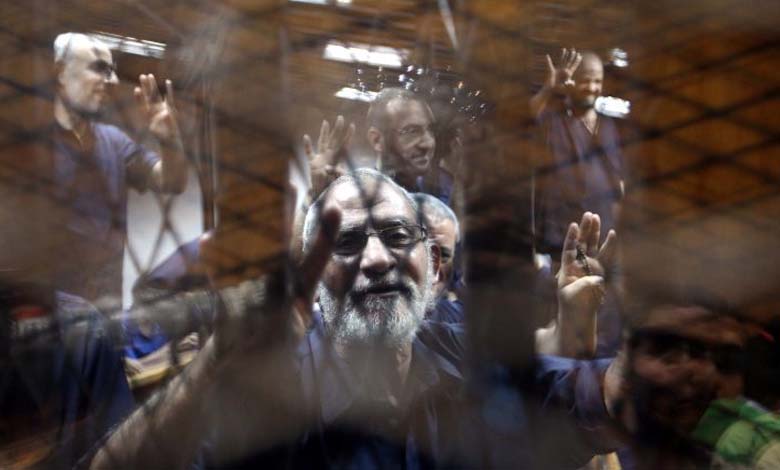Egypt’s Muslim Brotherhood and the Prisons: Rumors Without Keys and Lies That Won’t Overturn Sentences

Hardly a day goes by without the terrorist organization of the Muslim Brotherhood resurfacing to spread its venom, now relying solely on fabrications as the last remnants of its crumbling arsenal.
Overthrown by a popular revolution more than a decade ago, the Brotherhood continues to recycle its outdated rhetoric, using paid online platforms and propaganda arms that now specialize in stirring ashes rather than igniting any fire.
-
A new slap to the Brotherhood in Egypt; The failure of calls November 11 marks the end of the terrorist organization
-
Inside the Formation of Egypt’s Muslim Brotherhood Terror Cells: Revelations in a Podcast
In its latest attempt, the organization’s official page and affiliated outlets circulated a rumor concerning conditions in rehabilitation and correctional centers. The goal: to secure the release of imprisoned leaders convicted of terrorism and violent acts.
The group challenged the fairness of the trials that led to those convictions, deliberately ignoring the comprehensive legal process that guaranteed the defendants’ rights before final rulings were issued.
-
From Hassm to Midan: Egypt’s Muslim Brotherhood attempts to reengage chaos
-
Their Hands Stained with Egyptian Blood: Who Are the Muslim Brotherhood Figures Yahya Moussa and Alaa al-Samahi?
Such efforts aim to undermine Egypt’s judicial and security institutions. However, the Brotherhood overlooks the fact that Egyptians are now more discerning and that state institutions can anticipate and neutralize these maneuvers before they take shape.
In a statement published by Egypt’s Ministry of Interior, a security source categorically denied the claims spread by a Brotherhood-affiliated page about alleged hunger strikes due to violations in a correctional facility. The source described the rumors as part of an ongoing campaign of falsehoods aimed at destabilizing the country and discrediting its stability.
-
Media Recalls the Crimes of the Muslim Brotherhood and Their Attempt to “Burn Egypt”
-
An Expert Reveals the Plans and Names of Muslim Brotherhood Centers Targeting the Region and Egypt
The statement confirmed that correctional centers adhere to the highest international standards in terms of living conditions and medical care for inmates.
Observers note that the Brotherhood has established dedicated digital cells tasked with disseminating propaganda and rumors. Their objective is to incite public unrest or at least create skepticism toward official government statements.
-
The Muslim Brotherhood and Lies: The group promotes old videos to deceive Egyptian public opinion
-
Rumors of the Muslim Brotherhood Reach Raba’a and Nahda… Egypt Denies
These cells were reportedly formed in 2015 under what was called the “fatigue and disruption” plan, designed by the group’s first administrative committee as a replacement for the Guidance Bureau during a transitional leadership phase.
These cells, staffed by Brotherhood operatives, systematically spread misinformation, targeting perceived enemies both inside and outside Egypt. They use manipulated media, including edited images and deepfakes, to plant false impressions among the public.
-
Did the Muslim Brotherhood aim to destroy the Egyptian identity? Details
-
The “Hasm” movement of the Muslim Brotherhood aimed to overthrow the ruling regime in Egypt… How?
Their disinformation strategy is fast-paced and event-driven, aiming for maximum psychological impact. In some cases, they attempt to trigger what’s known as the “sleeper effect,” where recipients forget the disreputable source and later relay the information as fact, thereby distorting public perception over time.
Brigadier General Dr. Tarek Gomaa, an expert in political Islam, has pointed out that both technological advances and sociopsychological factors contribute to the widespread dissemination of rumors. In today’s digital age, many people rely heavily on platforms like Facebook and X (formerly Twitter) for their information.
He emphasized that rumor-spreading is a deliberate strategy crafted by the Brotherhood’s leadership to undermine Egypt’s societal fabric. The top leadership designs it, and grassroots members are tasked with carrying it out with precision.
-
The Muslim Brotherhood’s crimes “will not be forgotten” … Egypt thwarts the group’s plans to sell Sinai
-
Lies and Allegations: The Muslim Brotherhood Exploits the Palestinian Issue to Undermine Egypt’s Image
-
Egypt’s Muslim Brotherhood decided to confront the police and any opponent… a confession exposes the group’s plots












